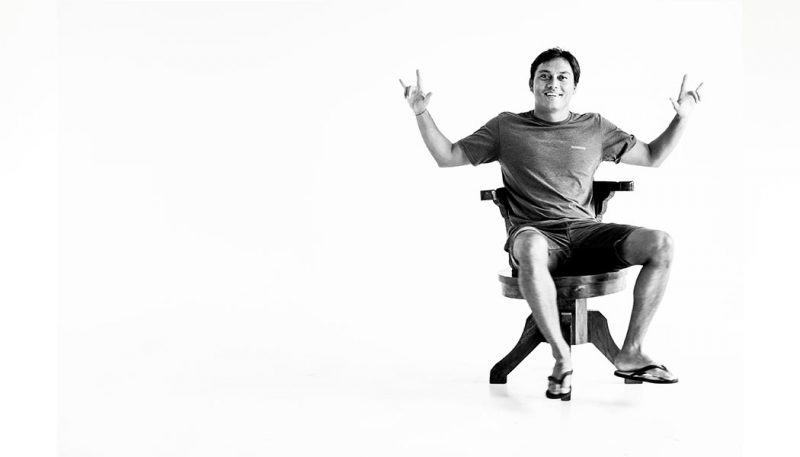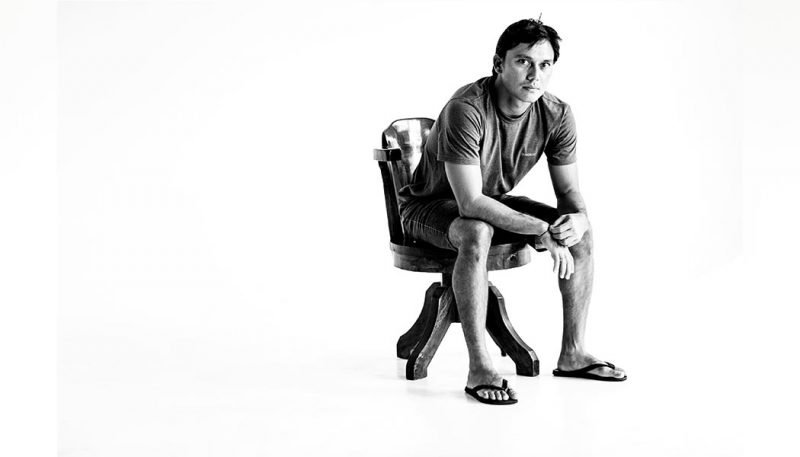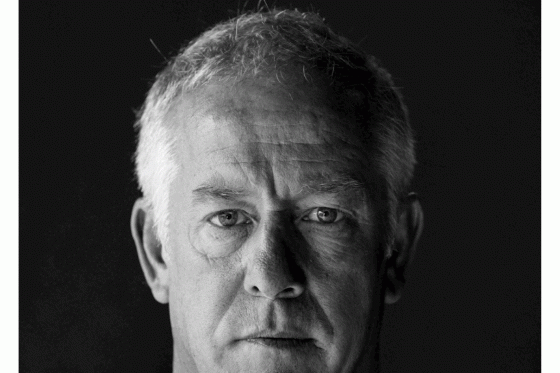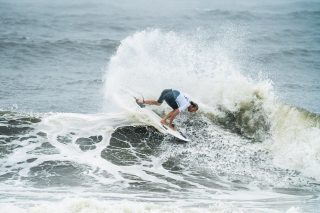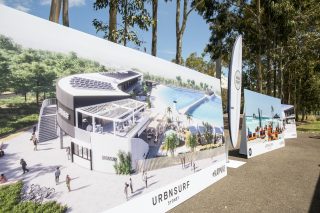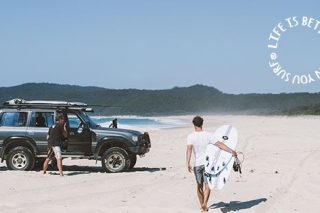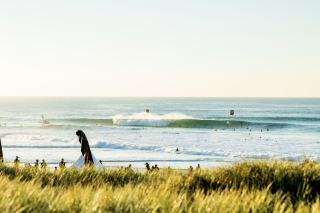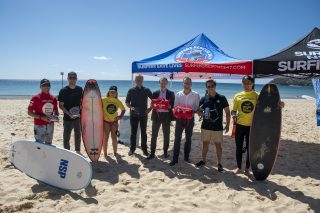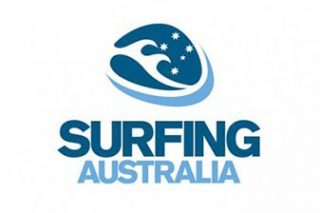The history of Indonesian surfing is dotted with exclamation points from the very first broadcast out of the jungle in 1995 at the Quiksilver Pro in G-land, through to various WSL specialty events such as the epic Rip Curl Pro Search in 2008. Stop number #5 on the 2018 WSL event calendar, the Corona Bali-Protected is in full flight at pumping Keramas Beach on Bali’s less storied East Coast. The event marks the return to WSL competition after a 5-year hiatus with the last CT event being held at Keramas being the Oakley Bali Pro in 2013.
From Kuta Boardriders to aspiring pro, Tipi Jabrik has ridden the wave of every high (and low point) of professional surfing throughout the Indonesia archipelago and as a local growing up in Bali, he’s observed the potential surfing has to deliver back to the island, though surf tourism, events and bringing a world focus to Bali’s increasing pollution problems. In 2017 the Asian Surfing Championship changed its name to Asian Surfing Co-operative and the ASC has expanded their events throughout the region. The small but hardworking ASC team lead by Tipi are now hosting the world’s best with the goal of making Indonesia a world class surfing region for the WSL but also for sustainable surf tourism. ASB Magazine caught up with Tipi to discuss the nuances of hosting events in Indonesia, the return of the CT and how to do business with governments and global organizations like WSL.
ASB MAGAZINE:It looks like you have a busy year ahead of you with the WSL schedule and QS events and also the Corona Bali Pro-tected event here in Indo?
Tipi Jabrik:I think the main thing is, it’s good for Bali and also Indonesia and our region, which is Asia because it’s a good platform for all surfers. In the beginning we had the ISC (Indonesian Surfing Championships) and now the (ASC) and we proved to the W.S.L. that we could be the right partners for them to grow surfing in this region. We would like to work closer with W.S.L. so whatever they do in this region we can help them and also benefit our region rather than people from the other side of the world running the show here, that’s the myth, that’s our main agenda.
ASB MAGAZINE: What exactly is your role and who is on your team and how did it all happen?
Tipi Jabrik: My role is just a lot of connecting the dots and I know a lot of people from the surfers to the people running the W.S.L. What we are trying to do is just convince them that we are the right people to work with because we’re not claiming that we’re running the show here, it’s proving that we are capable and we’ve been doing a lot of successful events with a lot of people here. Back in the day, the surfing industry was behind our events, but more so now it’s the local government and central government, and just trying to let them know the potential of surfing events. That it can create an income especially, and an economic impact for a lot of those areas in Indonesia and that’s what we’re trying to sell to them. We (ASC) are basically a small team of local and some [expat] crew.
ASB MAGAZINE:Looking back in time when did you first imagine that what is happening right now could be possible for Indonesian surfing?
Tipi Jabrik: I think as soon as I surfed in a contest, it was either California or Japan, as soon as I surfed on a wave in that competition I knew something big could happen in Indonesia because I compared the wave, I compared the weather, I looked at why would people come this far and kept coming year after year if the wave is not that good? I’m talking about Indonesian people, they’re not going to go back to Japan or California when it’s the wave is not that good. Not just the main venues Indonesia is famous for but places like Roti Islands, where the ASC travels too, I know surfers would rather surf there. I think I visualized what’s possible here when I compared the waves, that’s how I visualized surfing events in Indonesia, it’s way better. So that’s how I visualized it back in the days.
ASB MAGAZINE:How were you involved in the surfing industry back at that time like the early (Association of Surfing Professionals – A.S.P.) events here in Indonesia
Tipi Jabrik:During that A.S.P. period I was still competing, I surfed the Lakey Peak event, I think I was only twenty-one. I was really young when the Quiisilver G-land events through the 90’s were held here and so I wasn’t involved with them, but my brother was surfing in them through an injury wildcard because Derrick (Ho?), who I think, who smashed his leg or something. I’m wasn’t involved but I remember when those events would come to Indonesia I wanted them to stay in Indonesia. I guess that’s how I first thought of being involved with them, like they’re the highest organization for professional surfing, so you know at the end of the day everybody would like to surf for free and get paid for surfing, so I wanted them to stay here for sure.
ASB MAGAZINE: How did you learn the skills to set up contest deals with all these different kinds of people from governments to CT Surfers and WSL?
Tipi Jabrik: I think the best way to learn about you know dealing with a lot of people is meeting a lot of people and also go to places because every place has a different culture. If you only stay in one spot I don’t think you have that confidence to talk to other people especially to explain your goals and also I think with the surfing industry, I just tell them “Hey, there’s a marketing potential with surf events”. With the government there is a tourism potential and then with the WSL we just proved to them that we have a good crew of people that can deliver on events. We’re not promising anything, we just want to work together with everybody. I learnt that it’s just about asking what they need to know, it’s not about what I want to know or the WSC wants to know, at the end of the day I don’t want to doing all this for other people if it’s not something they really want. If I can help a little bit, to grow surfing in my country that’s good enough, for me.
ASB MAGAZINE: Why aren’t there more WSL contests in Indonesia? The best waves are here and everybody comes here even on their own time, yet there are few pro surfers based here.
Tipi Jabrik:I think one of the reason is because Indonesia also has a lot of political situations back in the late 90’s and since then it’s almost like hit and run. 2005, 2009 and then also 2013 so it’s almost like, not consistent , but it’s always been present. And over that time there’s been no consistent group of people running events here in Indonesia. It’s more like a small organization that has a lot of people behind it and they have to feed everybody that’s also can become cost consuming and so keeping and retaining and working with the right people where everybody gets paid is a challenge. We don’t really deal with the budget side of things well, so we only get paid for contest fees for what we do, and that’s fair enough. But back in the day, it’s hard to find the right people because the knowledge and people are in Indonesia, they still lack information about surf events and now everybody is surfing…. we have a small group of people, regularly judging events, and also the industry people are behind ASC and now their government is behind it. I think future is just getting better for surfing in Indonesia, especially for sports tourism.
ASB MAGAZINE: The governmental involvement is kind of what’s driving the change because the surf industry doesn’t seem to be have a lot of money for major events?
Tipi Jabrik: In the beginning the surfing industry is the one that initiated it and at the end of the day the surf industry has limitations on the how they can support us. But the government has an unlimited budget to actually to support their country, their nation and local government also to support their region. So now they see the potential and they want to invest in their local area as their surfing destination in places like; T-land in Roti Island, it’s all because of the surf destination in the beginning and the local government is recognizing that surfing is the main source of tourism.
ASB MAGAZINE: So, surfing is driving a change with the way government thinks about the region?
Tipi Jabrik: Surfers are the ones that have opened the doors to tourism, you know they’re the ones who have the key, they are the ones who travelled through open jungle in Gland and you know exposed it to the world, so it’s all because of surfers. I always like to remind the local government to try open up your regions, your waves because there’s potential there, and that’s what I’ve been doing along with the ASC tour, wherever we go.
ASB MAGAZINE: How big of an impact is the I.S.C and the A.S.C. and in the growth of surfing in your opinion in Indonesia and other Asian countries?
Tipi Jabrik:I think I.S.C. and A.S.C. have what we call like a roll-on affect. It was small and it’s become bigger because of the number of surfers, they’re the one who’ve grown up. We still stay the same but we’re just sharing new spots around Indonesia. Ten years ago, people only surfed in the main places that are already known but now we go places like India, we go to Taiwan, we go to Philippines and now they can grow on their own. Even Malaysia has more surfers these days so I think the ASC is just giving the idea and then one day when everybody is ready to run their own show we can step back. Eventually we want to run the bigger picture you know, which is having more Asian representation on the highest level of the W.S.L. and hopefully have more Indonesian surfers represented and then well have a really strong region.
ASB MAGAZINE:I heard that one of the main reasons you started the I.S.C was so that you could compete in great waves, never have to travel to cold places again! Is that true?
Tipi Jabrik: Ha! So yeah. I think it’s not true because one of the main reasons why is I’m a competitor, I like to compete. I still compete these days and I know as soon as the event is on I don’t do anything so I can be a competitor, so I don’t make any decision during the event so I am not taking any focus away from competing.
ASB MAGAZINE:But sometimes you’re a Contest Director
Tipi Jabrik: Yeah but I mean, I’m not judging. When I was young I was like ‘oh I would have to surf you know places like Canggu’… that was my dream. I remember when I was a little older, I went to Newcastle. I drove for two and a half hours from Sydney it was stormy, as soon as I parked my car they yelled my name and I rushed into my wetsuit, not more than twenty-five minutes I lost my heat and I said, “This is not happening to me, this is the worst thing in my life!”. So that’s one of the reasons why I fought for more waves in Indonesia. Not running from bad conditions, but you want to run in good conditions for for yourself and for other people. That’s it I think…. I want to compete in good waves.
ASB MAGAZINE:Being born and raised in Bali and raising your own family here you know how do you balance your family affairs, your other businesses that you have and then still have time to put so much effort into surfing?
Tipi Jabrik: At the end of the day surfers are you know they’re really selfish and they don’t care about anything else when the wave is pumping and they don’t even realize they have two kids and a wife and a business…. the wave is good and all you want to do is to surf. So, when they run at Ulu’s when the wave is good, everyone’s just super happy because they get around to my life, especially with surfing. My wife comes to the beach almost every weekend now, we take the kids so I think there’s a good future for our kids with surfing, there’s a future hopefully in Indonesia you know because I would like to see my kids surfing, not as a professional surfers but at least when they surf, they appreciate the water, they want a clean beach, clean ocean.
ASB MAGAZINE: How’s your kids, are they already in the water?
Tipi Jabrik:They already surf so. It also shows to other family’s that going to the beach with your kids and family is a good lifestyle because a lot of Indonesia people they don’t bring their kids to the beach because it was said once that it’s too dangerous
ASB MAGAZINE:What other business interest you have that keeps you busy?
Tipi Jabrik: I think one of the reasons why I like to travel around in Asia is to see the first right of opportunity, to see the potential, so that’s one of the reasons I also invest on properties and then maybe one day I’m going to have a couple resorts at some high-class quality wave location. Those people that are there from the beginning, they’re the people that have the best chances in business. My interest in business is just still in surfing, everything related to surfing. Maybe one day, if I’m not doing anything for surfing…running surf events maybe can still take advantage of my connection with the surf world and then just retire running a couple surf resorts, that’s my plan.
ASB MAGAZINE:Switching gears, what do you think about this whole Quiksilver and Billabong merger into Boardriders. You were sponsored by Quiksilver for quite a few years.
Tipi Jabrik: It a funny thing about the surf industry, it’s the rivalry that makes the company grow bigger and without competition they just want to stay the same. So Quiksilver and Billabong they are the two big companies that are always competing with their team riders, with their events. Now I think retailer’s business is super tough, there is lots of competitors. So one of the best ways to work it out is actually working together, have a stronger strategic think about the future by combining as Boardriders. At the end of the day, if you think you cannot fight the battle why don’t you join forces? and I think that’s what Quiksilver and Billabong are doing. I hope it’s going to make the surf industry healthier because this past ten years there’s been a lot of news about bankruptcy, about the how bad the stock market is. Maybe in a couple years there’s going to be even more grassroots events from this kind of company putting back into junior events, on the ground events and then now just the whole step until the C.T. because it has to come from this kind of company. It cannot come from other companies that have no relation to surfing. I’m looking forward to this and the changes that will come from it.
ASB MAGAZINE: What people have been the biggest influences on Indonesia surfing over the years
Tipi Jabrik: I think my biggest influence is the older crew that moved from Australia to Bali, that had a dream about moving to Indonesia and surf and trying to survive here, people like Steve Palmer, Robert Wilson, Michael Little also the other crew like King Kong (Agus Prihandoyo)and all those unique characters that give color to surfing in Bali. We have to respect them, so opening in the Gland camp with his friend Mike William and it’s not about competition and trying to make money but those people are inspired to surf and they influenced me. I think they are the pioneers of the whole tourism industry here in in Bali, especially people like Peter McCabe and the whole Morning of the Earth, crew. So, you know they are some of my biggest influence for sure.
ASB MAGAZINE:Why has it taken so long for professional surfing to come back to Bali?
Tipi Jabrik:The most difficult part is not working with the right people because (last time) it was run I would say it wasn’t run smoothly. It’s almost like they (WSL) events come and expect everything to be supported because we’re going to do good in your work places, but (they) don’t ask what is good, you know so as a Westerner sometimes you need to ask how can we help? Or how much will it cost for me to run this show? So (they) need to learn about the culture and then it’s easier when all the boys, all the local people are behind you not you have to deal with them on and on like….as a….
ASB MAGAZINE: As a take it or leave it kind of thing?
Tipi Jabrik:Yeah, it should be as easy as that but we had to start from beginning again under the new WSL and hopefully everybody understands that a surf event it’s not something that everybody should get paid without doing nothing because that’s what happened in the past. And it’s not ‘we’re going to pay you because we’re going to use the waves’ is not like that either. I think these days the way we should approach events is to ask how we can work together and what do you need and hopefully they (WSL) understand whatever they do it’s all about marketing, and hopefully these places are growing.
ASB MAGAZINEIs the most difficult part to convince the W.S.L. or is it to convince the local government that these events are sustainable in Indonesia?
Tipi Jabrik:I think it’s both The W.S.L. understands how to work here and local government needs to be aware there’s a lot of potential working with the W.S.L. because they are the ones who have the keys to surfing and the business of surfing here in Indonesia.
ENDS
